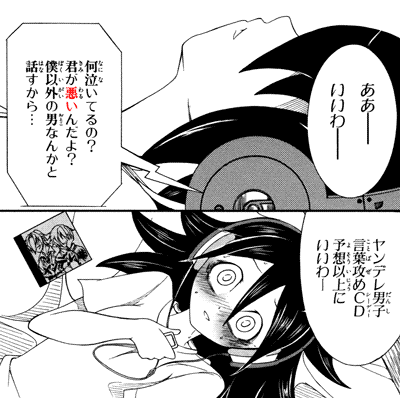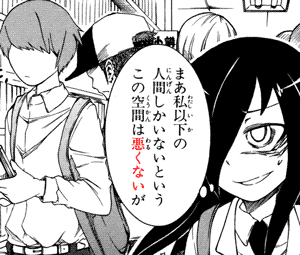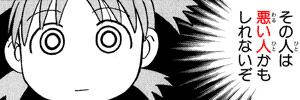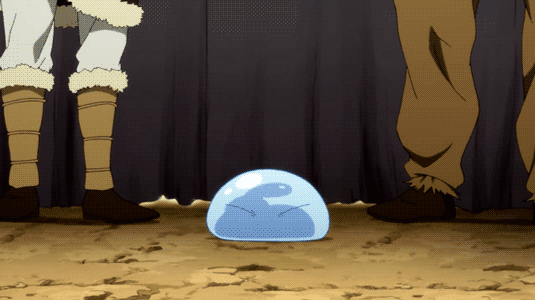Since it can be pretty hard to tell which meaning exactly you're facing in any given phrase, I recommend you to read the whole article to familiarize yourself with all the ways warui can be used, rather than just reading a few sections.
- Basic Usage
- Conjugation
- Antonym
- "Sorry"
- Warii 悪ぃ【わりぃ】
- It's Your "Fault"
- Warukatta 悪かった
- That Was a "Mistake"
- Warukunai 悪くない
- "Wrong"
- Warui Kedo 悪いけど
- Niwa Warui Kedo には悪いけど
- Waruku 悪く
- Warusa 悪さ
- Set Phrases
- Other Words That Mean "Bad"
Basic Usage
At basic levels, warui 悪い works just like any Japanese adjective:- tenki ga warui desu
天気が悪いです
[The] weather is bad.- Predicative:
- The adjective comes at the end of the sentence (before the copula) and describes the subject, marked by the ga が particle.
- warui tenki
悪い天気
Bad weather. (attributive.)- Attributive:
- The adjective comes right before the noun.
In the phrases above, the grammar is pretty simple, and all you're is that something is "bad." Literally. However, sentences in the exact structure above than have figurative meanings. There are idiomatic expressions, etc. containing warui that won't translate to "bad" in English.
We'll see that later, but first, some basic information about the word.
Conjugation
Here's how to conjugate warui:- warukatta
悪かった
Was bad. - warukunai
悪くない
Not bad. - warukunakatta
悪くなかった
Was not bad.
Antonym
The antonym of warui 悪い, "bad," would be ii いい, "good," which's never conjugated, and its sibling word, yoi 良い, which's used instead for when you need to conjugate ii.- ii いい
yoi 良い
Good. - yokatta
良かった
Was good. - yokunai
良くない
Not good.
Although ii いい and its synonym yoi 良い are rather weird adjectives, grammatically they work just like warui:
- tenki ga ii
天気がいい
[The] weather [is] good. - ii tenki
いい天気
Good weather.
The Antonym of Your Antonym is Your Synonym
Sometimes, yokunai 良くない, "not good," is used instead of warui to say something is "bad." Naturally, something that is "not good" is consequently "bad," so it's more about word choice than meaning.Usually, when speaking about the action of others, yokunai is used instead of warui, probably because saying what someone is doing is "not good" is less direct than saying what they're doing is "bad."
- sore wa yokunai
それは良くない
That isn't good. (doing that is bad, ok?) - kenka wa yokunai
喧嘩は良くない
Fighting isn't good. (don't fight, guys!)
It can also be used instead of warui in other situations, specially in its literal meaning:
- tenki ga yokunai
天気が良くない
The weather isn't good. (it's bad.)
It's not always you can replace warui with yokunai. In particular, when warui is used idiomatically (to say "sorry," etc.) it can't be replaced by yokunai.
"Sorry"
The word warui 悪い can be used as an informal way to say you're "sorry" for something. Literally, it's closer to "my bad" than sorry.- warui
悪い
Sorry.
My bad.
Oops.
Technically, warui is more like admitting something is "bad." Since you're admitting it's bad, it sounds like you're apologizing, even though, literally, you are not.
Because of this, warui is used when you make some trivial mistakes. It isn't an actual apology, like sumimasen すみません or gomen nasai ごめんなさい, so you don't use warui for serious stuff.
Consequently, if a character really screwed up and all he can say is warui, other characters may get mad at him for not understanding the gravity of his mistakes.
Warii 悪ぃ【わりぃ】
When the okurigana of warui 悪い is a small kana, it's read as warii 悪ぃ. This is a colloquialism: it's the same word, but with a more informal, relaxed pronunciation.- warii warii
悪ぃ悪ぃ
Sorry, sorry.
Telling 悪い and 悪ぃ apart may feel a little difficult for beginners, but in vertical text the difference is more apparent, and sometimes katakana is used instead in the okurigana, 悪ィ, so it's not as hard as it seems.
It's Your "Fault"
The word warui 悪い can be used to say someone's at "fault" for something. Literally, it says who's "bad" for something. Who's "wrong." For example:- omae ga warui-n-da
お前が悪いんだ
You are bad.
You are to blame.
It's your fault.
You're wrong. - kare ga warui-n-da
彼が悪いんだ
He's wrong. It's his fault. - watashi ga warui
私が悪い
I'm wrong. It's my fault. - Watashi ga Motenai no wa Dou Kangaetemo Omae-ra ga Warui!
私がモテないのはどう考えてもお前らが悪い!
I'm not popular: no matter how you think about it, you all are to blame!
No matter how I look at it, it's you guys fault I'm not popular!
Manga: Watashi ga Motenai no wa Dou Kangaetemo Omaera ga Warui! 私がモテないのはどう考えてもお前らが悪い! (Chapter 3)
- Context: a girl enjoys an audio CD.
- aa~~
ああー
Ah~~ - ii wa~~
いいわー
[It's] good~~ - nani naiteru no?
何泣いてるの?
[Why are you] crying? - kimi ga warui-n-da yo?
君が悪いんだよ?
It's your fault, [you know]? - boku igai no otoko nanka to
hanasu kara...
僕以外の男なんかと話すから・・・
It's because [you] talk with guys other than me... - yandere danshi
kotoba-zeme shidhii
ヤンデレ男子言葉責めCD(シーディー)
Yandere boys verbal abuse CD- yandere ヤンデレ
Mentally ill and in love. (personality type.) - E.g. stalker, abusive boyfriend, etc.
- yandere ヤンデレ
- yosou ijou ni ii wa~~
予想以上にいいわー
It's better than I imagined.- Good above expectation. (literally.)
- Tomoko is enjoying a CD in which yandere characters speak verbally abusive phrases into her ear. In the featured scene, the yandere boy narrates the girl (the self-inserted listener, Tomoko) is crying. We can safely assume he made her cry somehow.
- He says it's her fault he made her cry—she's the "bad" one, not him—because he saw her talking to other guys.
- This is a typical pattern in abusive relationships where the guy tries to monopolize the girl. It's so typical there's even a name for it in anime: dokusen-gata yandere 独占型ヤンデレ, "monopoly-type yandere."
- And yes, such CDs actually exist. People pay money for this. Here, I googled it and got an example video free on Youtube that has an English translation (you might want to listen it with headphones on so people don't ask what in the world you're listening to. I mean it. You really, really, REALLY don't want to have to explain the lines.):
- (josei muke onsei) ryuugaku-gaeri yandere danshi ni kankin sareta (orijinaru)
【女性向け音声】留学帰りヤンデレ男子に監禁された【オリジナル】[2019-01-23]
(voice for girls, i.e. target audience is female)
Confined (i.e. kidnapped and kept locked somewhere) by a yandere boy returning from studying abroad
(original, i.e. not a parody)
- (josei muke onsei) ryuugaku-gaeri yandere danshi ni kankin sareta (orijinaru)
Warukatta 悪かった
The word warukatta 悪かった, "was bad," is often used to say you're "sorry" for something or someone is at "fault" for something, too. The main difference being that, since warukatta is in the past, the apology and blame refer to the past too.- warui
悪い
Sorry. (for something that just happened.)
It's my fault. - warukatta
悪かった
Sorry. (for something that happened in the past.)
It was my fault.
- kare ga warui
彼が悪い
He's to blame. (for something that just happened, or for a situation that's still happening.) - kare ga warukatta
彼が悪かった
He was to blame. (for something that happened in the past.)
- warukatta kara ayamaru
悪かったから謝る
[It] was bad so [I'll] apologize.
That was my fault, so I'm going to apologize.
That Was a "Mistake"
The word warukatta 悪かった is also sometimes used to admit specific actions were "bad." That is, to admit a "mistake" done in the past. And, consequently, to kind of apologize for said mistake.- are wa warukatta
あれは悪かった
That was bad.
That was a mistake.
I'm sorry for that.
Warukunai 悪くない
The word warukunai 悪くない, "not bad," is likewise used instead of ii, "good," to say something is good. Again, this is about word choice rather than meaning.After all, saying something is "good" sounds like a stronger endorsement than you might be committed to make.
The word can be used, for example, when someone is offered food, and asked what they think about the taste.
- warukunai
悪くない
Not bad.
Or when something didn't go exactly the way the character wanted, but he's okay with how it turned out.
- kore mo warukunai
これも悪くない
This, too, isn't bad.
This is fine too.
It can also be used to deny that someone is to blame for something.
- kare ga warukunai
彼が悪くない
He's not bad.
He's not to blame [for this].
It's not his fault. - Dou Kangaetemo, Watashi wa Warukunai
どう考えても、私は悪くない
No matter how you think about it, I'm not to blame.
No matter how you look at it, it's not my fault.
(title of the ending theme of WataMote.)
Manga: Watashi ga Motenai no wa Dou Kangaetemo Omaera ga Warui! 私がモテないのはどう考えてもお前らが悪い! (Chapter 4)
- Context: nerd girl likes place full of nerds.
- maa まあ
Well. - watashi ika no
ningen shika inai toiu
kono kuukan wa warukunai ga
私以下の
人間しかいないという
この空間は悪くないが
This space [in which]
[there's nobody better than me]
isn't bad, though.- watashi ika no ningen
私以下の人間
Humans equal-or-below me.
Humans lesser than me.
People worse than me. - ...shika inai ~しかいない
There's nobody but... [humans lesser than me, in this place.] - ga が
But. However. Though.
- watashi ika no ningen
"Wrong"
The word warui 悪い can be used to ask what's morally "wrong" about something. Literally, it asks what's "bad" about it, but if you ask what's bad about it, it's because you're supposed to correct it, and if you need to correct it, it's because it's "wrong."- nani ga warui-n-da?
何が悪いんだ?
What's bad?
What's bad about it?
What's wrong about it?
Usually, characters that use phrases containing warui like this are doing something they believe is right, and questioning why everyone seems to be against them.
- hito wo tasukete nani ga warui?
人を助けて何が悪い?
What's bad about helping people?
What's wrong about helping people? - sore no doko ga warui?
それのどこが悪い?
Where of that is bad?
Which part of that is bad?
What's bad about that?
You don't use warui to say something is "wrong" is the general sense. For example, if you got the answer wrong in an exam, that's "wrong" but that's not morally "bad." In this case, the word would be:
- machigau
間違う
To be wrong. (intransitive.) - machigatte-iru
間違っている
To be wrong. (intransitive, te-iru form.) - machigaeru
間違える
To do something wrong. (transitive.)
To make a mistake doing something. - kotae wo machigaeta
答えを間違えた
To have wronged the answer. (literally.)
To have chosen the answer wrongly.
The verb machigau can also refer to something morally wrong.
- omae wa machigatte-iru
お前は間違っている
You are wrong.- You have strayed the path of righteousness and justice, you villain!
Warui Kedo 悪いけど
The phrase warui kedo 悪いけど, literally bad, but," is generally used when something you do wrongs someone, and is translated as "sorry, but."Like I said before, using warui in this fashion kind of admits something you did is "bad," so with this phrase you're admitting it's bad, but, regardless, it's what's going to happen. It can be used in basically every way you'd say "sorry, but" in English:
- warui kedo tooshite morau
悪いけど通してもらう
Sorry, but [I'] will have [you] let [me] pass through.- Stop blocking my way!
- warui kedo shinde kureru
悪いけど死んでくれる
Sorry, but could [you] die [for me]?- srsly just die already.
- warui kedo kyoumi nai
悪いけど興味ない
Sorry, but [I] have no interest.
Sorry, but [I'm not interested.] - warui kedo jikan ga nai
悪いけど時間がない
Sorry, but there's no time.
Sorry, but [I don't have time.]
This phrase can also be used with the "fault" meaning.
- kare ga warui kedo,彼が悪いけど、
He's bad, but...
It's his fault, but...
(insert some excuse or reasoning after.)
Niwa Warui Kedo には悪いけど
The phrase niwa warui には悪い is used to say something is bad for someone specifically. It's normally used in the form of niwa warui kedo には悪いけど, which usually translates to "I'm sorry for [...], but..."- kare niwa warui kedo, ikou
彼には悪いけど、行こう
It's bad for him, but let's go.
I'm sorry for him, but let's go.
We'll be wronging him, but let's go.
He won't like it, but let's go.
This phrase is usually used when a third party is going to be affected by the plans between the speaker and the listener. Of course, it can also be used to admit wrongdoing in advance to the listener:
- omae niwa warui kedo
お前には悪いけど
It's bad for you, but...
Sorry for you, but...
You won't like it, but...- Practically same meaning as just:
- warui kedo.
Waruku 悪く
The word waruku 悪く is the adverbial form of warui 悪い. Grammatically, warui describes nouns (things) as being bad, while waruku describes verbs (actions) as being bad.- waruku omou-na yo
悪く思うなよ
Don't think badly [of me.]
Don't think bad [of me.]
In Japanese, it's possible to conjugate a verb into a noun, then you can use warui with the verb. But in its normal verbal forms, you can only use waruku with verbs, not warui.
- *warui omou
悪い思う
(ungrammatical.) - warui omoi
悪い思い
Bad feelings. Bad thoughts.
Warusa 悪さ
The word warusa 悪さ is the word warui plus the -sa ~さ suffix. Literally, it means the "bad-ness" of something, but it's often used to refer to mischief in general instead.- tenki ga warui
天気の悪い
The weather is bad. - tenki no warusa no gen'in
天気の悪さの原因
The cause for the bad-ness of the weather.
The reason why the weather is so bad.
- warusa wo suru
悪さをする
To do mischief.
To do bad stuff.
Set Phrases
The word warui 悪い is commonly found in a few set phrases that have negative connotations. Such phrases are interesting because, if you switch warui 悪い for its antonym, ii いい, you get a positive connotation instead.Warui Hito 悪い人
For starters, when warui is adjective for hito 人, "person," you have:- warui hito
悪い人
Bad person. (literally.)
The antonym being simply:
- ii hito
いい人
Good person.
These refer to a morally good or bad person. That is, a warui hito is a villain, not someone who's bad at math or whatever.
Manga: Yotsuba to! よつばと! (Chapter 1)
- sono hito wa
warui hito kamo
shirenai zo
その人は
悪い人かも
しれないぞ
That person might be a bad person.
A lot of other nouns that refer to people can also be used in the same format:
Anime: Tensei shitara Slime Datta Ken, 転生したらスライムだった件 (Episode 6)
- warui suraimu janai yo
悪いスライムじゃないよ
[I'm] not a bad slime, [you see!]
Warui Koto 悪いこと
Since warui is an adjective, not a noun, it doesn't refer to something bad in particular, it only refers to the quality of being bad. In Japanese, the noun koto こと tends to be used to refer to something bad.- warui koto wo shita
悪いことをした
[I] did something bad.
-ga Warui ~が悪い
A number of things which can be said to be "bad" by literally stating "X is bad" in Japanese end up being translated as an adjective in English because of what the phrase actually implies. For example:- atama ga warui 頭が悪い
Head is bad. (literally.)
[He's] stupid. (what it means.) - un ga warui 運が悪い
Luck is bad.
[He's] unlucky.
[That's] bad luck. - naka ga warui 仲が悪い
Relationship is bad.
[They're] not in good terms. - taido ga warui 態度が悪い
Attitude is bad.
[He's] arrogant.
All of the phrases above can have the warui switched by ii, in which case it will be "good" adjectives (smart, lucky, behaved) instead of "bad" adjectives.
Note that when using ga warui to blame someone—kare ga warui, "he's to blame"—then you can't switch to ii, as it will mean something else: kare ga ii, "he's fine."
Other Words That Mean "Bad"
Besides warui, there are other words in Japanese that can be translated to "bad" in English. These words mean "bad" in a sense, and will be translated as "bad" in a given context, but may be translated as something else in other contexts. For example:- aku
悪
Evil. - mazui
不味い
Bad taste. (not delicious.)- How is the taste?
- It's bad; mazui
- mazui!
まずい!
This is bad!- Used in emergencies:
- It's the cops! Run run run!
- It's going to explode!
- The teacher is going to find out.
- Etc.
- heta
下手
Bad skill. Badly done.- What do you think of my drawing?
- It's bad; heta
- He sucks; heta
Further Reading
See Also
- warii 悪ぃ, 悪ィ, ワリィ, わりぃ
Relaxed pronunciation of warui. Mostly used by delinquents in manga.
References
- 【わりい】と言う謝り方はあるのですか? - detail.chiebukuro.yahoo.co.jp, accessed 2019-01-29.




No comments: